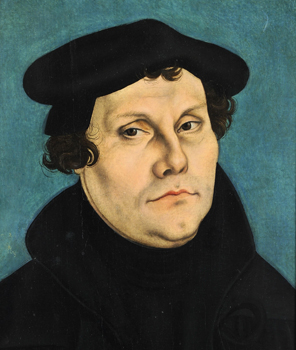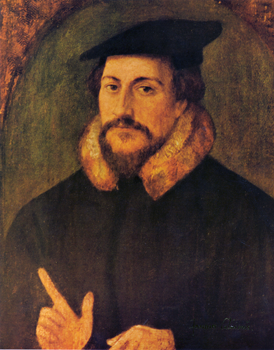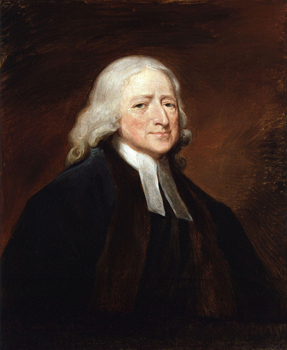If you came to my house, you would find almost nothing of much monetary or aesthetic value — save one minor exception. Some time ago, my brother-in-law gave us two pages from old Bibles that we had framed. They now hang in my office.
One page is Acts 24 from a 1549 Matthew's Bible, originally translated by William Tyndale. The other is Jeremiah 3 from a German Bible published by Anton Koberger in 1483. Neither of these is valuable, but I like them because they remind me of my Protestant heritage.
For sixteen centuries, the Bible was available only to scholars who could read Hebrew, Greek or Latin. Its interpretation was controlled by the church. But then, during a remarkable ten-week stretch when he was hiding in a castle in Wartburg, Germany, Martin Luther translated the Greek New Testament into vernacular German.
 |
|
Martin Luther.
|
The initial edition of 3,000 copies that appeared in September 1522 included twenty-one woodcuts by Lucas Cranach. It sold for half a gulden, about a week's pay for a skilled carpenter. It quickly sold out. It would be 1534 when the complete Bible with both testaments was published. When he died in 1546, there were 350 editions of Luther's Bible. "He had become, by far, the most published writer in the world," says Reston. He had also permanently altered all of western history.
There were, in fact, fourteen editions of the complete Bible translated into German before Luther's famous translation, and my Koberger page comes from one of them, published in 1483 — the year Luther was born, and just 27 years after the Gutenberg Bible of 1456 that is widely considered the first book printed in Europe.
On October 31, Protestants will celebrate Reformation Day. The town of Wittenberg will host the 500th anniversary of Luther nailing his Ninety-Five Theses to the door of the Castle Church. The town, which has a population of 50,000, is expecting 400,000 tourists.
So, what was the Reformation, and why do we remember it today?
The Protestant Reformation was many different and complex things; it radically altered every sector of European society — church, culture, politics, economics, universities, governments, education, and the everyday lives of ordinary people.
By the end of the seventeenth century, European religion had become a function of geography in a badly fractured continent — cuius regio, eius religio: "where you come from decides your religion, and within that region no other can be tolerated." (MacCulloch).
Christians tortured, burned, beheaded, and quartered each other over the nature of baptism and the Lord's Supper. From the Peasants' War in 1525 until the Peace of Westphalia in 1648 that ended the Thirty Years War, there were precious few times and places without barbaric warfare. "It was a process of extreme mental and physical violence," says MacCulloch.
 |
|
John Calvin.
|
Eventually, toleration and generally peaceful co-existence did result. Hereditary and state powers as divinely sanctioned rights succumbed to the rule of law and the voices of citizens. Individual conscience displaced institutional coercion.
The Reformation spawned a historical way of thinking from which we continue to benefit today. MacCulloch calls this "a remarkable exercise in honest thinking."
It protested clerical corruption and church hypocrisy that had festered for a millennium. People had had enough of religious authoritarianism, exploitation and abuse. Purification of the church and restoration to its original integrity, however idealistic, became the order of the day.
The Reformation also birthed what Alister McGrath calls a revolutionary and dangerous idea — that ordinary Christians, as opposed to any centralized religious authority, could and should read the Bible for themselves in their own language, and draw their own conclusions from it. That Bible, by the way, is now available in 2,370 different vernacular languages. As a consequence, says McGrath, "uncontrollable" forces were unleashed 500 years ago by Luther and his kin.
The most fundamental question of any religion, notes McGrath, is who has the right or authority to define its faith. For Protestants, the answer to that question seems to be "no one," for "what [has] distinguished Protestantism… is its principled refusal to allow any authority above scripture." Thus, McGrath calls Protestantism "a method" and "not any one specific historical outcome of the application of that method."
It is precisely this "method" that elevates one's personal conscience and Scripture above both tradition and the church, and that encourages private interpretation, that the great Orthodox theologian Georges Florovsky once called "the sin of the Reformation."
Catholics knew that encouraging individuals to read the Bible for themselves, in their own vernacular, would undermine the authority of their hierarchy. Thus, the Roman Index of 1596 prohibited translations of the Bible into everyday vernacular, and publicly burned such Bibles as they could find.
 |
|
John Wesley.
|
Catholics also rightly predicted that sectarian zeal devoted to privatistic Bible-reading would fragment the church into scattered shards. Today we have over 20,000 Protestant "denominations," every one of which justifies its existence to some degree by claiming that it alone "has the magic," or at least more magic in a more pure, original, and authentic form than other Christians.
As a Protestant, I'm thankful for the Reformation. I wouldn't want a church or broader society that had not reformed our medieval inheritance. Recall that eastern Orthodox Christianity and greater Islam have not had any similar reformation. In some ways our own American experiment is a product of the Protestant Reformation.
But I'm also painfully aware of the carnage, the fragmentation, and the institutionalization of the gospel that followed in its wake. So, I like the dictum that emerged among some early Reformed communities: ecclesia reformata sed semper reformanda, "the church reformed, but always needing to be reformed."
The Baptist theologian A.J. Conyers called this "correcting the correction." The work of genuine reformation, whether of the institutional church or of an individual life, is never finished.
For further reflection:
Bruce Gordon, John Calvin’s "Institutes of the Christian Religion": A Biography. Lives of Great Religious Books Series(Princeton: Princeton University Press, 2016), 277 pp.
Diarmaid MacCulloch, The Reformation (New York: Viking, 2003), 792pp.
Martin Marty, Martin Luther (New York: Penguin, 2004).
Alister McGrath, Christianity's Dangerous Idea; The Protestant Revolution—A History from the Sixteenth Century to the Twenty-First (San Francisco: HarperOne, 2007), 552pp.
James Reston, Jr., Luther's Fortress; Martin Luther and His Reformation Under Siege (New York: Basic Books, 2015), 260pp.
Image credits: (1) Wikipedia.org; (2) Wikipedia.org; and (3) Wikipedia.org.



